-
About
First-Year Application Deadline
Don't miss your chance to apply to Marist and join the Red Fox Family!
• Early Decision II and Regular Decision: Sunday, Feb. 15About
-
Academics
First-Year Application Deadline
Don't miss your chance to apply to Marist and join the Red Fox Family!
• Early Decision II and Regular Decision: Sunday, Feb. 15Academics
-
Admission & Financial Aid
First-Year Application Deadline
Don't miss your chance to apply to Marist and join the Red Fox Family!
• Early Decision II and Regular Decision: Sunday, Feb. 15Admission & Financial Aid
-
Student Life
First-Year Application Deadline
Don't miss your chance to apply to Marist and join the Red Fox Family!
• Early Decision II and Regular Decision: Sunday, Feb. 15Student Life
- Athletics
A man working in front of the computer
School of Management
February 2019
Stepping Up to Help
Fifteen student members of Beta Gamma Sigma, the business honor society, volunteered their time and talents at the Walk to Defeat ALS last fall.
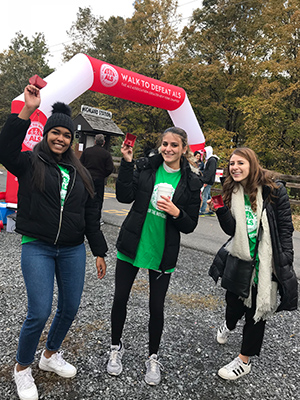
“My grandfather died of ALS when I was only a few months old, and I have been volunteering for the ALS Walk in Westchester County for as long as I can remember,” said Colleen Kelly ’19, a co-vice president of BGS. “At last summer’s walk, I was wearing a Marist T-shirt. One of the directors approached me and said she would love to get Marist students involved in the walk in Dutchess County.” When the fall semester began, Kelly proposed the idea to club members — and it was enthusiastically received.
While they did not participate in fund-raising efforts, the students took part in the 2.5-mile walk and helped with the event’s logistics. “We helped out at the registration and T-shirt booths, with parking, in the kids zone, and assisted the PALS (people with ALS),” Kelly said.
"Participating in the walk was a great opportunity to help support people for a great cause,” said Taylor Ziman ’19, BGS co-vice president. “I’m really happy Marist got to be a part of this special day, as it was very meaningful to be able to cheer people on as they walked for their loved ones."
“The fact that Marist and the members of BGS were so willing to volunteer and support this cause goes to show the principles and values that this school and honor society have instilled in its students,” Kelly said. “I am proud to be a Red Fox!”
IN THE PHOTO: Beta Gamma Sigma members Kayla Smith ’19, Reanna Notarantonio ’20 and Lauren Vecchio ’19 at the Walk to Defeat ALS
Giant Steps
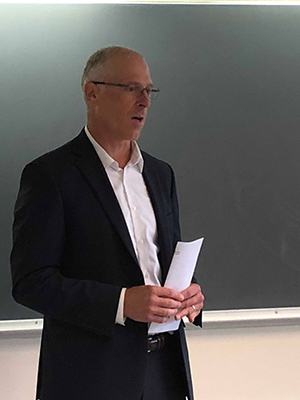
Alumnus and Board of Advisors member Paul J. Stento ’90 addressed students in the Career Management class last semester. A senior vice president and senior financial advisor at Merrill Lynch Wealth Management in Albany, Stento’s visit was part of the course’s “Standing on the Shoulders of Giants” module: He discussed how his Marist education influenced his career and prepared him for the business world. Career Management is co-taught by SoM professors Joanne Gavin and Rena Hill.
Adventure Abroad
Along with attending class and pulling all-nighters before exams, meeting new people and enjoying new experiences are the hallmarks of what a college education is all about. Perhaps no one on the Marist campus understands this better than Joshua Polgrean ’20, who spent the fall semester at the school’s campus in Florence, Italy.
“It might sound like a cliché, but it was an experience that I never knew that I needed so badly,” says Polgrean, who’s majoring in business with a concentration in finance. “Other than an occasional bout of homesickness, I thoroughly enjoyed it.”
A Dutchess County resident, Polgrean said the decision to attend Marist was “an easy choice”: His father, David, earned a B.S. here in 2007. But having grown accustomed to the familiar environment, with family living nearby, made relocating to a foreign country a bit jarring. “When I landed, I was riding a high — all these emotions were coursing through me,” he remembers. “But then it hit me: I’m overseas, I’m on my own, without access to my family. I have to rely on myself.”
But studying abroad had always been a goal for Polgrean, and Marist’s partnership with Istituto Lorenzo De'Medici was a perfect fit. “I knew that Marist had a great, centrally located campus in Florence — which was important to me, because I wanted to be able to travel.” During his stay, he visited several European countries, including Ireland, England, Austria and Germany.
Studying in such a cosmopolitan city was markedly different from hitting the books in Poughkeepsie. “There was such a liveliness to Florence,” Polgrean said. “Walking down the street, we’d see people from all over the world. It was great to see so much diversity in such a small city.” Polgrean figures he walked eight to 10 miles most days, taking different roundabout routes from his lodging “on the Duomo side of the Arno” to and from his classes.
That diversity extended into the classroom as well. “Here at Marist, I tend to take a lot of classes along with my friends,” he said. “In Florence, I found myself working in group projects with students from the Middle East, from China, from California —and each person brought a different insight and perspective.”
Polgrean, who earned all As in the five classes he took while abroad, will intern this summer at JPMorgan in its global finance and business management division. As for future plans, he hopes to work in banking, “but I just want to do something that makes me happy and where I can make a difference — no matter how minor that difference may be.”
Polgrean was the recipient of the School of Management’s Eugene Melan Scholarship in Business Leadership, which provided financial assistance for his three-month stay abroad. “I want to thank the School of Management for helping me fund my trip,” he said. “It was an experience that I will cherish for the rest of my life.”
Alum lauded for valor
Marist alumnus Vincent L. Reda ’15/MPA ’18 was one of seven Yonkers, New York police officers who responded to a shooting incident in the city’s Park Hill section on September 25, 2017. During the shootout, one of the officers was shot in the jaw; she survived. Two suspects were subsequently arrested at the scene, one of whom was charged with first-degree attempted murder.
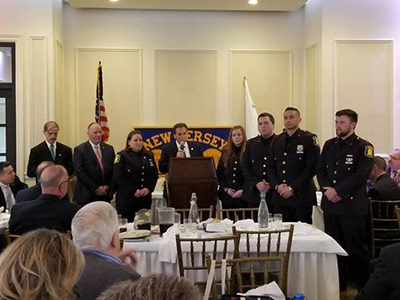
Maryanne Reda says that her son — who has been on the job for just one year — had always dreamed of becoming a Yonkers police officer. “I thank Marist for giving him the foundation to get where he is today,” she said.
IN THE PHOTO: Yonkers Police Officer Vincent L. Reda (second from right) and six colleagues receive a reward for heroism from the Detectives Crime Clinic of New Jersey and New York. (Photo: Yonkers Police Dept.)
Alumni Profile: Michael Fino ’90
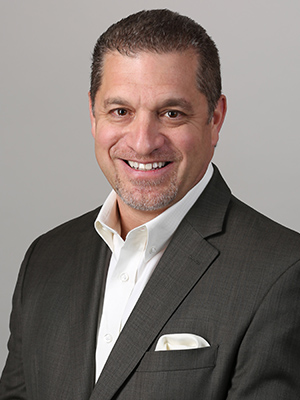
Q: Please give us a brief overview of your career to this point.
A: I started out at IBM Poughkeepsie the day after I graduated from Marist. I was in a program that gave me experience in many functional disciplines — manufacturing, industrial engineering, finance, business operations — so I got a comprehensive set of business skills. In 1996 I moved to Raleigh, North Carolina to work with the IBM PC company. Working in Poughkeepsie gave me a lot of visibility to the mainframe environment, but going into the PC business provided me with a different mind-set in terms of business velocity and execution. I learned how supply chain management could be a critical discipline for driving organization efficiency. Among the positions I held was the manufacturing manager for North America for all IBM servers, PCs and laptops. I went on to Duke for my MBA and graduated in 2001. This was around the time that we were starting our family, so my wife and I decided to consider opportunities to move back north.
In 2006 I took a job in Poughkeepsie as the director of supply chain for our Systems Division that produces the IBM Mainframe and Power computers. In 2008 I moved into the Channel organization within IBM — first in business operations, then in the client engagement space. In April 2018 I moved into the role of IBM Partner Ecosystem COO. The way the organization is structured, this gives me the responsibility for transformation, operations and client engagement missions for the Channel ecosystem.
Q: Could you explain what the “IBM Channel” as a route to market is all about?
A: At IBM we have different routes to market that enable us to best serve our clients. Our channel team consists of more than 90,000 business partners worldwide who are extensions of the IBM sales engine. These partners consist of both large firms and smaller niche companies that deliver a very specific value proposition for our clients. Our partners either sell specific point products of IBM or they work to integrate our technology with their own solutions to satisfy the needs of our clients.
Our partners have very good relationships with the businesses they support; this enables them to provide a level of service that would be impossible for IBM without the extended support of the channel. They represent IBM products — along with our competitors’ products, too. I spend a good portion of my time working with these partners to ensure that we provide the best products and business processes for them to be competitive and profitable. They are also hearing from Microsoft and Oracle and Dell, etc., and I want them to lead with IBM as their vendor of choice.
Q: What’s your typical workday like?
A: My day will change depending on what time it is in the quarter. In the beginning, I’m usually focused on our initiatives to improve the ease with which our partners can execute business with IBM. If there is complexity, that could drive up their costs or slow down business velocity. It is critical we maintain the mindshare of our partners so they feel that doing business with IBM is the best way for them to support their customers and achieve their business goals. Towards the end of the quarter, I’m focused on the execution of this strategy and driving business results for IBM and our shareholders.
In addition, I have a team that is focused on business partner satisfaction.
Last May we started using Net Promoter Score (NPS), a methodology that determines client advocacy for your business. Evidence suggests that an advocate of your business will be four times less likely to cancel your product or service. We survey our partners and respond to the feedback we receive within 24 hours. Understanding what makes our partners either satisfied or dissatisfied with IBM is a 365-day role for us.
Q: You’ve been working for IBM for 30 years. How have you adapted to industry changes during that time?
A: In order to survive for 30 years anywhere, you need to have a growth mind-set. You must be open to learning new skills and embracing new ways of doing things. I see people who don’t have this mind-set; they really struggle with the rate and pace of change, not just at IBM but in all businesses. They resist change, and if you resist for too long, they’re going to move on without you.
As a leader, you can’t have the same style as you had 20 years ago. In the old days, the boss told you what to do and then came back to see how well you did it. Servant leadership is different approach to being a manager: I’m still going to ask you to do things, but I’ll also ask how I can best support you in accomplishing those objectives. Given the shortage of skilled workers, you can’t afford to have your workforce constantly changing, so our goal as managers is to be more supportive and create an environment of inclusion within the workforce.
Q: Did you have a mentor? What did you learn from him/her?
A: Over the years, I’ve had a lot of mentors at IBM who helped me think through critical business decisions and manage work/life balance.
Over the last seven-eight years, I’ve also had a reverse mentor: Someone who is much younger and newer to the business. This person gives me a perspective on how I’m doing with a different demographic of employee: “This is what I was hoping to accomplish; did I hit the mark?” If you’re not willing to take that feedback and incorporate it into improvement, then you’re going to be disappointed that your approach is not being well received by your team.
Q: What business accomplishment are you most proud of?
A: My biggest business accomplishment is perseverance: Being able to reinvent myself over 30 years, continuing to provide value for the company that I work for, and trying to be a better person each and every day.
Getting to know… Prof. Halimin Herjanto
Although he’s only been living in Poughkeepsie for a few months, Halimin Herjanto says the Hudson Valley area “feels like home in a sense, with the green mountains and the river.” The “home” he is referring to is Auckland, New Zealand, about 8,900 miles away (as the crow flies).
Herjanto, the SoM’s new assistant professor of marketing, was born in Indonesia, but he hasn’t lived in that country for more than 30 years. “I had no intention of living in a foreign country,” he says, “but I wanted to try new things.” He chose to settle in New Zealand because “at the time, it was the closest and most affordable English speaking country to Indonesia. Australia was closer, but more expensive.”
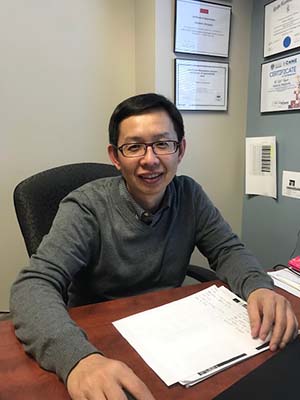
“I was in Japan for four years, the last two with Carrefour. At the end of that time I thought, ‘I work from early in the morning to late at night almost every day, and I have no time to spend with my wife. I don’t want to live like this.’ So we decided to emigrate to New Zealand.”
Herjanto worked at a bank while studying for his bachelor’s degree at Manukau Institute of Technology in Auckland. After he earned his degree, the company offered him an education package that allowed him to complete his first master’s degree — from Auckland University of Technology — on their dime. He continued his studies at the university, completing a second master’s and then his Ph.D. on a full scholarship. With diplomas in hand and “fed up” with the nine-to-five life, he decided to try teaching. “The head of the department at Auckland gave me the opportunity to teach two classes, Marketing Principles and Consumer Behavior,” he says, “and I loved it. I was able to blend in my work experiences and provide that information to the students, so they could relate to the topic. It was so rewarding, I knew it was the way I should go.” After receiving job offers from five colleges in five different countries, he chose to become an assistant professor at McKendree University in Lebanon, Ill. He remained in that position for four years before accepting an offer to join Marist in 2018.
“When I heard New York, I thought only of New York City,” he remembers. “I didn’t realize that the Hudson Valley was so beautiful.”
Herjanto currently teaches two courses: Marketing Principles and Marketing Management (for the MBA program). “The people at Marist accepted me from day one. I like the school, the students are polite and respectful, and the administration is supportive. I don’t feel homesick — except when it snows.”
